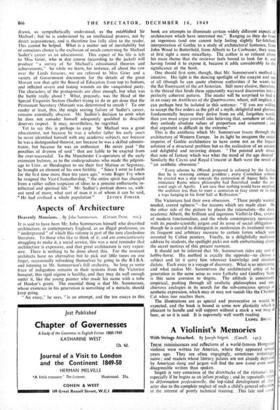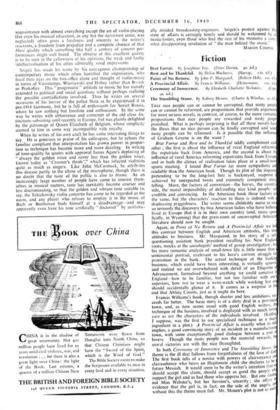A Violinist's Memories
With Strings Attached. By Joseph Szigeti. (Cassell. 1p.) 'MESE reminiscences and reflections of a world-famous Hungarian violinist were written for America, where they appeared severs' years ago. They are often engagingly, sometimes irritatingly naive ; and readers whose literary palates are not already depraved by American slang and jargon will find the new koine even more disagreeable written than spoken. Szigeti is very conscious of the drawbacks of the virtuoso's lilt, especially if he begins as an infant prodigy ; and he repeatedly ref en deformation professionelle, the lop-sided development of .:har- acter due to the complete neglect of such a child's general educatlee in the interest of purely technical training. This late and casuil acquaintance with almost everything except the art of violin-playing (for even his musical education, in any but the narrowest sense, was neglected) often gives a freshness and sincerity to the writer's reactions, a freedom from prejudice and a complete absence of that blase quality which something like half a century of concert per- formances might well breed. The obverse of this excellent *Way is to be seen in the callowness of his opinions, the weak and faulty ;ntellectualisation of his often admirably vivid impressions Seigeti has made his name by his courageous championship of contemporary music which often horrified the impresarios, who fixed their eyes on the box-office alone and thought of violin-music in terms of Vieuxtemps, Wieniawski and Hubay rather than 131rtok or Prokoficv. This " progressive " attitude to music he has naively extended to political and social questions without perhaps realising the possible contradictions involved. Thus he writes on several occasions of his horror of the police State as he experienced it in pre-1914 Germany, but he is full of enthusiasm for Soviet Russia, where he saw nothing but freedom and enthusiasm. In the same way he writes with abhorrence and contempt of the old class dis- tinctions subsisting until recently in Europe, but was plainly delighted by the patronage of Queen Elizabeth of Belgium, whose simplicity seemed to him in some way incompatible with royalty.
When he writes of his own craft he has some interesting things to say. He is generous in praise of his colleagues, but he echoes the familiar complaint that interpretation has grown poorer in propor- tion as technique has become more and more dazzling. In writing of tone-quality he quotes with approval James Agate's deploring of " always the golden voice and never less than the golden voice, known today as 'Crooner's throb '," which has infected violinists quite as much as singers. Like John McCormack, he attrib.aes this disease partly to the abuse of the microphone, though there is no doubt that the taste of the public is also to blame. As an increasingly large number of people have come to interest them- selves in musical matters, taste has inevitably become coarser and less discriminating, so that the golden and vibrant tone suitable to. say, the Tchaikovsky violin concerto has come to be regarded as the norm, and any player who refuses to employ it in the music of Bach or Beethoven finds himself at a disadvantage—and may apparently even have his tone artificially " doctored " by aesthetic- ally minded broadcasting-engineers. Szigeti's protest against ee state of affairs is certaijaly timely and should be welcomed by at music-lovers, even those who find the rest of his memoirs a some what disappointing revelation of " the man behind the music."
MARTIN COOPER.



































 Previous page
Previous page